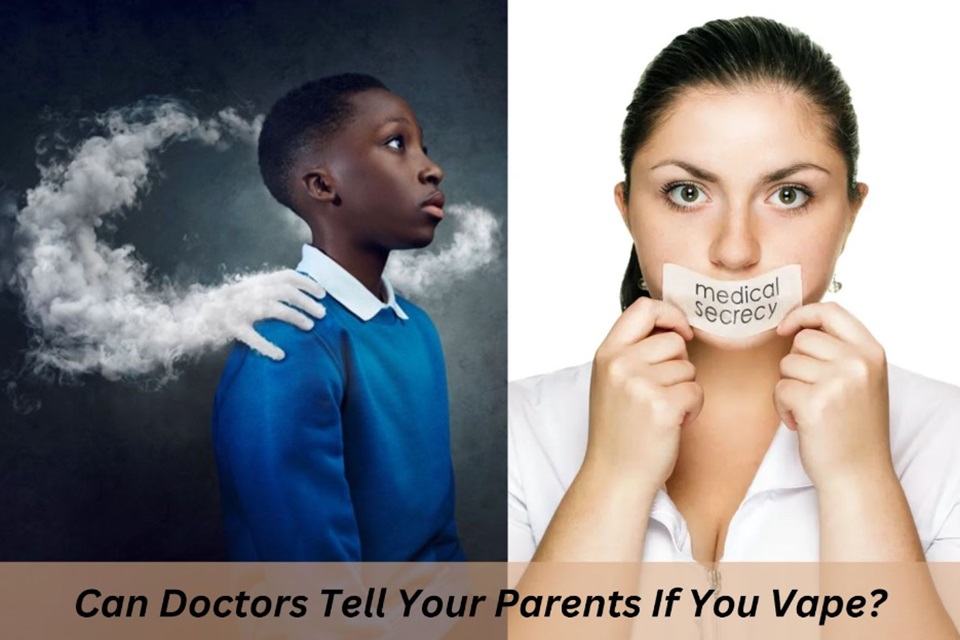Medical Confidentiality: Can Doctors Tell Your Parents If You Vape? Learn About Exceptions
Vaping has surged in popularity, particularly among teenagers, creating both health and privacy concerns. The discreet nature of vaping, combined with appealing flavors, has made it a preferred choice over traditional smoking. However, the health risks associated with vaping and the implications for medical confidentiality are significant, particularly for minors. This article examines whether doctors can inform your parents if you vape, the boundaries of medical confidentiality, and the exceptions to these rules.
Understanding Vaping
Vaping involves inhaling vapor from an electronic device that heats a liquid containing nicotine, flavorings, and other chemicals. While it’s often marketed as a safer alternative to smoking, vaping carries its own health risks. Nicotine addiction, lung damage, cardiovascular issues, and oral health problems are some of the potential consequences. Moreover, the long-term effects of vaping are still not fully understood, making it a concerning trend among youths.
Health Implications Of Vaping
- Nicotine Addiction: Nicotine is highly addictive, especially for developing brains in teenagers, potentially leading to lifelong addiction.
- Lung Damage: Vaping can cause significant lung damage, including chronic bronchitis and other respiratory conditions.
- Cardiovascular Risks: The increased heart rate and blood pressure associated with nicotine can lead to heart disease and stroke.
- Oral Health Issues: Nicotine can contribute to gum disease, tooth decay, and other oral health problems, and it is easily detectable during dental check-ups.
The Principle Of Medical Confidentiality
Medical privacy is a fundamental aspect of healthcare, ensuring that patient information remains private. This principle allows patients to share sensitive information with their doctors without fear of it being disclosed. For teenagers, understanding the extent of this confidentiality and its limitations is crucial, especially when it comes to habits like vaping.
Confidentiality For Minors
The confidentiality rules for minors can be more complex than for adults. Generally, healthcare providers strive to maintain confidentiality to encourage honest communication. However, there are specific scenarios where this confidentiality might be breached:
- General Medical Care: For routine medical issues, doctors might inform parents, especially if the care requires parental consent or involvement.
- Specialized Medical Services: Services like reproductive health, mental health care, and substance abuse treatment often come with stricter confidentiality protections, even for minors.
Legal Age Of Vaping & Its Implications
The legal age for vaping varies globally, influencing how healthcare providers handle confidentiality. In the United States, the legal age is 21, while in many European countries, it ranges from 18 to 21. These legal distinctions impact whether a doctor might disclose a minor’s vaping habits to their parents.
Exceptions To Medical Confidentiality
While confidentiality is a cornerstone of medical ethics, there are notable exceptions:
Risk Of Harm
If a doctor believes that the patient is at risk of harming themselves or others, they may disclose information to prevent harm. This is particularly relevant if vaping has led to severe health issues.
Legal Obligations
Doctors may be required to report certain conditions or behaviors, such as infectious diseases or suspected abuse, which might involve informing parents or authorities.
Doctor-Patient Communication And Trust
Open and honest communication between doctors and patients is vital for effective healthcare. If you vape, discussing it openly with your doctor can ensure you receive the best advice and care. Doctors are trained to provide non-judgmental support and can offer resources to help you quit if that is your goal.
Can Doctors Tell Your Parents If You Vape?
Whether a doctor can tell your parents about your vaping depends on several factors:
- Age and Legal Framework: Confidentiality rules become stricter once you reach the legal age of majority. For minors, these rules can vary.
- Health Impact: If vaping has resulted in significant health issues, a doctor might need to involve your parents to provide appropriate care.
- State and Country Laws: Different regions have varying laws regarding the confidentiality of minors, particularly concerning substance use and health risks.
Navigating Conversations About Vaping
If you’re concerned about your parents discovering your vaping habits, consider the following steps:
- Be Transparent with Your Doctor: Honest communication ensures you receive the best possible care and advice.
- Know Your Rights: Familiarize yourself with the confidentiality laws in your state or country.
- Discuss Privacy Concerns: Address your privacy concerns with your doctor to understand what information might be shared.
- Prepare for Conversations: If you decide to inform your parents, plan the conversation carefully, and consider seeking your doctor’s guidance.
Seeking Help & Support
Quitting vaping can be challenging, but numerous resources are available:
- Counseling Services: Professional counselors can provide strategies and support to help you quit.
- Support Groups: Engaging with peers in support groups can offer encouragement and shared experiences.
- Nicotine Replacement Therapy: Options like nicotine gum or patches can assist in managing cravings.
Final Words
Medical confidentiality is designed to protect patient privacy and foster trust between patients and healthcare providers. While there are exceptions to these rules, particularly for minors, understanding your rights can help you navigate your healthcare journey more confidently. Open communication with your doctor about your vaping habits is essential for receiving the best possible care and support.
FAQs
Can doctors disclose my vaping habits to my parents?
It depends on your age, the specific health issue, and the laws in your state or country. Generally, confidentiality is maintained, but there are exceptions.
How can I quit vaping?
Seek support from counseling, support groups, and nicotine replacement therapies. Your doctor can help develop a quitting plan.
Can dentists tell if you vape even if you don’t mention it?
Yes, dentists can often detect signs of vaping, such as gum disease, dry mouth, and other oral health issues that are associated with nicotine use.
How can I ensure my conversations with my doctor remain confidential?
Discuss your privacy concerns with your doctor upfront. Understanding your rights and the specific confidentiality laws in your area can also help ensure your information is protected.





